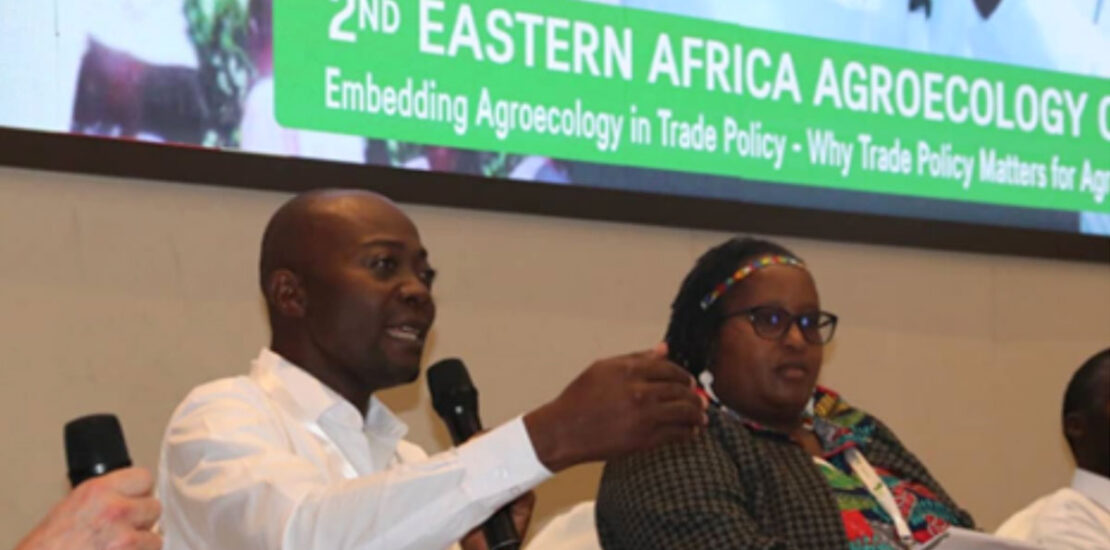Multi-Stakeholder and Multisectoral Engagements for the Promotion of Agroecology
- April 10, 2025
- Posted by: CEFROHT Reporter
- Category: Agroecology

The Centre for Food and Adequate Living Rights (CEFROHT), in partnership with global and regional allies—including BothEnds (Netherlands), SEATINI-Uganda, the Participatory Ecological Land Use Management (PELUM) Association, and BIBA-Kenya—jointly organised a high-level side event titled Trade Policy and Agroecology at the 2nd East Africa Agroecology Conference, held from 25th to 28th March 2025 in Nairobi, Kenya.
This side event served as a key platform within the broader continental conference, bringing together policymakers, civil society organisations, researchers, farmers, and international development partners committed to advancing agroecology in Africa. It provided a strategic space for knowledge exchange and policy dialogue on how global and regional trade frameworks impact the transition to agroecology and the livelihoods of smallholder farmers across East Africa.
Discussions centred on the growing influence and implications of international trade frameworks on local food systems and the viability of agroecological practices. Key focus areas included:
The African Continental Free Trade Area (AfCFTA): Participants analysed how AfCFTA’s implementation could support or hinder agroecology. While the agreement offers opportunities for increased intra-African trade, its current structure prioritises liberalised trade in agricultural commodities without explicitly recognising agroecology. This risks marginalising agroecological products and practices that prioritise local markets, traditional seed systems, and food sovereignty.
UPOV 1991 and Seed Sovereignty: The session raised concerns about the International Union for the Protection of New Varieties of Plants (UPOV 1991) agreement and its imposition through trade negotiations. The agreement protects commercial plant breeders’ rights, often at the expense of farmers’ traditional rights to save, share, and exchange seeds. Stakeholders emphasised that UPOV 1991 is incompatible with agroecological seed systems, which rely on biodiversity, farmer-managed seed systems, and collective stewardship of genetic resources.
Rules of Origin and Protocols on Trade in Goods: Participants agreed on the need to critically review AfCFTA’s Protocol on Trade in Goods and Rules of Origin to reflect African realities. Agroecological producers—particularly smallholder women and youth—often fail to meet strict, industrially designed origin certification criteria, limiting their participation in regional and global value chains. Stakeholders recommended revising these rules to favour inclusive, people-centred agroecology trade frameworks that ensure fair market access for ecologically grown products.
The event concluded with forward-looking policy recommendations to align international and regional trade policies with agroecology, food sovereignty, and ecological justice in Africa:
African governments must play a proactive role in drafting, negotiating, and implementing trade policies affecting food and seed systems, ensuring they reflect Africa’s unique developmental and ecological context.
AfCFTA’s Protocols on Trade—particularly those governing agriculture and natural resources—should be reviewed and realigned to protect smallholder farmers’ rights and promote agroecological production, including reconsidering tariff liberalisation, investment provisions, and sanitary standards.
Agroecology-specific certification and labelling schemes must be developed and embedded in trade regulations to help farmers access premium markets and protect them from unfair competition with industrial, chemically intensive products.
Safeguards are needed against multinational agribusiness influence in trade policies, particularly those promoting proprietary seeds, chemical inputs, and genetically modified organisms (GMOs), to preserve farmer-managed systems and biodiversity.
Grassroots movements, smallholder farmers (especially women and youth), must be meaningfully included in formulating and monitoring trade agreements to ensure policies uphold human rights, ecological balance, and traditional knowledge systems.
This multi-stakeholder engagement reaffirmed that trade policy is a critical frontier in the struggle for agroecology and food sovereignty. There is an urgent need to reorient trade frameworks to serve people, the planet, and community-based food systems—not corporate profits. CEFROHT and its partners pledged to continue dialogue, build stakeholder capacity, and advocate for transformative trade policies institutionalising agroecology across East Africa and the continent.
The engagement also laid the groundwork for follow-up actions, including policy briefs, joint advocacy campaigns, and collaborative research to influence national and regional trade policymaking in favour of sustainable, agroecology-based food systems.
